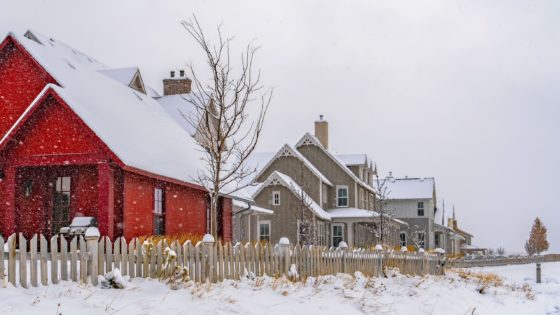
The Chicagoland area is known for some horrific winter storms, including blistering cold temperatures. Once these arrive, your heating system will either keep you comfortable and safe or utterly fail. Here are the best tips for preparing your HVAC system to handle the intense winter storms.
Deal With Airflow Restrictions
Your system depends on circulating air, both through your home and through the system itself. Anything inhibiting airflow will add strain to your system, which translates into higher utility bills and early component failure. Find and deal with any possible airflow restrictions to ensure your system doesn’t experience unnecessary strain.
Start by inspecting your air filter and ensuring air still passes through it easily. The common 1-inch air filter needs replacing about every 90 days, but it may be more frequent over the dry winter months. Plan to check it monthly to prevent long-term clogs from damaging your system. When you do check it, gently vacuum the intake side to help extend its useful life.
Next, check to make sure your vents are open and have at least a 2-inch clearance above and around each. Closed vents prevent your system from creating the circulation needed to evenly heat your home. Whenever possible, keep the doors open to any room heated by your system to encourage circulation.
Keep an Eye Open for Minor Problems
Minor problems are the slow cause of death for HVAC systems. These problems add strain to the system, regardless of the weather outside. This causes an increase in your utility expenses but also wears on your system’s components.
This additional strain and wear leads to premature component failure. Unfortunately, this failure usually happens with the strain brought on by intense winter storms, right when you depend on your system the most.
If you have subtle signs something in your system isn’t working properly, call to have a professional technician troubleshoot the problem. Signs that warrant a call to your technician include:
- Cooler air from your vents
- Unusual squealing or rattling sounds
- Poor airflow from your vents
- Unusually long or short heating cycles
Improve Your Indoor Air Quality
Air quality is the measure of how many contaminants are floating in your air. The worse the air quality, the more contaminants, and the more likely they’ll affect your HVAC system.
Winter is a horrible time for air quality because you keep the windows closed, and the air is generally much drier. Drier air means airborne contaminants are lighter and stay in the air longer. It also causes more of them in your house due to dry skin and pet dander, and dry wood and leather.
To combat these dry conditions, the EPA recommends maintaining an indoor humidity level of 30% to 50% relative. This weighs down airborne particles and resolves added contaminants from dry conditions. Consider adding a humidifier to your HVAC system to help control your humidity and improve your indoor air quality.
Test Your Thermostat
If your thermostat isn’t operating correctly, you can’t expect your heating system to run properly either. The average thermostat will function well for 10 to 15 years. As it ages, it won’t register the temperature accurately, leading to longer heating cycles.
Test your thermostat against an independent thermometer to ensure it’s accurate. If it’s nearing the end of its service life or is reading inaccurately, plan to replace it with a programmable unit. Then be sure to use the program options to reduce the strain on your system when you’re not home to enjoy the heat.
Get Routine Maintenance
Maintenance is one of the most critical tasks for keeping your system ready for extreme weather. During a maintenance visit, your tech will clean the airflow restrictions that occur internally to your unit. This usually includes at least the heat exchanger and the circulating fan wheel.
They also test your system, including each of the critical components. The goal is to find small performance issues before they cause major damage to your system. If your tech finds something not working optimally, you have the chance to fix it before the weather intensifies. This protects your system from breaking down during high-strain storms and keeps your home safe and comfortable.
Since 1946, people around Arlington Heights have depended on IBBOTSON Heating & Air Conditioning Co. to keep their homes comfortable and safe. Our NATE-certified technicians provide heating and air conditioning installation, maintenance, and repair along with indoor air quality solutions. Call to schedule your heating maintenance or repair with one of our expert technicians today.
